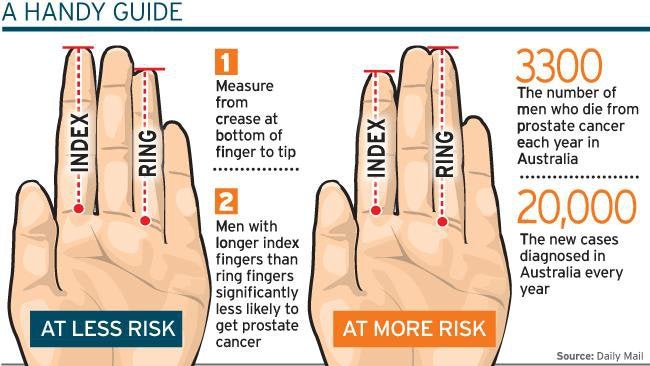It’s a simple do-it-yourself health test, no equipment needed: Stretch your hands out in front of you and look at how long your fingers are. Most men have ring fingers that are slightly longer than their index fingers, while in most women these fingers are roughly the same length.
So what? Well, variations to these typical findings may have important implications for your health. It turns out that hormones released in the womb influence finger length and, as odd as it sounds, they also have important effects on future health and behavior. Gad Saad, PhD, professor of marketing and research chair in evolutionary behavioral sciences and Darwinian consumption at Concordia University in Montreal, and his colleagues have examined numerous studies involving finger length and found lots of interesting associations.
THE “CASANOVA PATTERN”
Dr. Saad refers to finger length as “a proxy of prenatal testosterone exposure,” explaining that the ratio between the index and the ring finger is determined early in pregnancy. The more exposure the fetus has to this predominantly male hormone, the more so-called masculine traits the adult will have (whether male or female) and the longer the ring finger will be.
Interesting fact: Having a long ring finger is known as the “Casanova pattern,” since Casanova was notably reputed to have a very long ring finger (in relation to his index finger). Dr. Saad told me that this means that “he had a highly masculinized digit ratio.”
According to Dr. Saad, early exposure to testosterone also affects how organs are formed, which is why this ratio is relevant to your future susceptibility to disease. In most people, the discrepancy between the ring and index finger is more pronounced on the right hand than the left.
FINGER LENGTH POINTS TO YOUR FUTURE
Here are some of the conclusions scientists have reached in recent years…
- An impact on disease risk. In the British Journal of Cancer , researchers reported that men whose index fingers were longer than their ring fingers (indicating less prenatal exposure to testosterone) were at lower risk for prostate cancer. On the other hand, scientists at Liverpool University observed that males with longer index fingers were at a higher risk for heart attack than other males, presumably because testosterone is heart-protective.
- A clue to sexuality. The Casanova pattern may offer a clue to sexual orientation. UC Berkeley scientists found that lesbian women tended (like men) to have longer ring fingers than index fingers. But, Dr. Saad said, the findings aren’t so straightforward for gay men. In homosexuals with several older, heterosexual brothers, researchers found a tendency to have much longer ring fingers than straight men… while those without older brothers were more likely to have the same male-pattern, longer ring finger as straight men.
- More sports ability. Scientists believe that high testosterone translates into better success on the playing field, as it encourages aggression, competitiveness and dominant behavior and also facilitates power, endurance and visual-spatial skills. At Temple University, investigators noted that men with longer ring fingers tended to do better in sports such as football and soccer.
- More aggression and risk-taking. At Cambridge University in England, researchers found that financial traders with longer ring fingers tended to be more aggressive and earned the most money. In another study, an analysis of students at Concordia, Dr. Saad and his team discovered that males with longer ring fingers took more recreational, social and financial risks.
LOOKING AHEAD
Your finger length is far from a perfect predictor of your health, of course, but you can consider it a helpful clue to what health challenges the future may hold — so you do all you can to circumvent them. For instance, if you are a male and your finger ratio suggests increased cardiovascular risk, ask your doctor to assess your heart health and pay close attention to cardio-related lifestyle choices such as diet and exercise. Plus, it’s a great conversation-starter when you need to make small talk — and that can be plenty helpful in life, too!
Source: Gad Saad, PhD, professor of marketing, holder of the Concordia University Research Chair in Evolutionary Behavioral Sciences and Darwinian Consumption, John Molson School of Business, Concordia University, Montreal, Quebec, Canada. Dr. Saad is author of The Evolutionary Bases of Consumption (Psychology Press) and the upcoming The Consuming Instinct: What Juicy Burgers, Ferraris, Pornography, and Gift Giving Reveal About Human Nature (Prometheus Books, to be published June 2011). He is a blogger at Psychology Today ( www.PsychologyToday.com/blog/homo-consumericus ).
BOSTON, MASSACHUSETTS – BOSTON TESTOSTERONE PARTNERS/CORE NEW ENGLAND
Testosterone Replacement Therapy with Boston Testosterone Partners , now available nationwide. We are New England’s leading choice for Male Wellness and Hormone Restoration for the treatment Low T, hypogonadism, Andropause and ED. Our medical director is a 25 year MD who has, for over ten years, been balancing both male and female hormones. He has been trained as a Hormone Specialist and has balanced well over a thousand male and female patients across the nation. Our patients have constant doctor interaction, he is always available daily to answer questions for our patients.
Our protocols include Sermorelin-GHRP2 Therapy, Glutathione Therapy, numerous Amino Acid Injectable combinations, personally tailored Weight Loss injectables, Cialis or Viagra sublinguals, Oxytocin sprays, and more..
Our services also include proven medical weight loss systems for BOTH men and women utilizing a proprietary combination of B12, B3, MIC, Amino Acids and L-Carnitine specially compounded for our patients. We offer uniquely compounded SuperB and LipoC injectables and capsules, available only from our compounding pharmacy.
And, we offer TESTOSTERONE REPLACEMENT THERAPY FOR MEN with the THE LOWEST PRICES in the nation!

